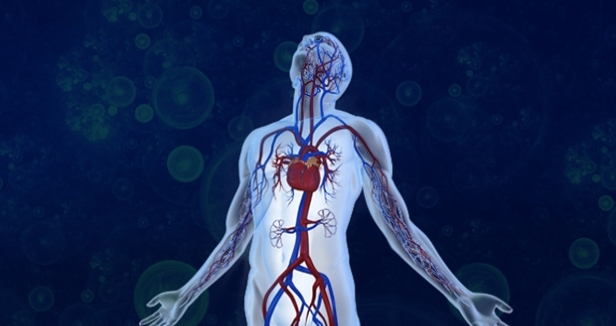Health Today
What Causes Chronic Inflammation?

 While inflammation
is necessary for your body to fight to fight infection and disease, chronic
inflammation is not something you should ignore. Illnesses, diet or vitamin
deficiencies, or any combination of these elements, can cause chronic
inflammation. It can contribute to health problems and is even being
investigated as a cause of cancer.
While inflammation
is necessary for your body to fight to fight infection and disease, chronic
inflammation is not something you should ignore. Illnesses, diet or vitamin
deficiencies, or any combination of these elements, can cause chronic
inflammation. It can contribute to health problems and is even being
investigated as a cause of cancer.
What Is Inflammation?
-
The National Cancer Institute defines inflammation as: "Redness, swelling, pain and/or a feeling of heat in an area of the body. This is a protective reaction to injury, disease or irritation of the tissues." This kind of inflammation is necessary for your body to fight infection and help it repair an injury, and it resolves within a period of time. Chronic inflammation is not necessarily in response to an injury, and it may not go away on its own.
Disease
-
Some autoimmune diseases, such as rheumatoid arthritis, lupus and Sjogren's Syndrome, are characterized by chronic inflammation. Researchers at Max-Planck-Institute of Neurobiology in Germany have discovered that this inflammation may be the result of problems arising from certain proteins involved in an immune response.
-
Infectious Agents
-
Certain infectious agents cause chronic inflammation. The bacteria Helicobacter pylori causes stomach inflammation. Hepatitis C causes inflammation of the liver. A recent study conducted at MIT, published in the "Journal of Clinical Medicine" confirmed researchers' suspicions that these types of inflammation put you at greater risk for stomach and liver cancer. Researchers found that during these inflammatory processes, DNA was damaged. Normally, your body would repair this damage, but some people's bodies don't, resulting in changes that can lead to cancer.
Nutrition and Diet
-
What you eat can also cause chronic inflammation. A recent study at the University of Missouri showed that vitamin D deficiency causes chronic inflammation, and researchers at the University of California at San Diego School of Medicine found that eating red meat introduces an inflammation-causing molecule not otherwise found in your body.
Solutions
-
Your doctor can run blood tests to see if you are suffering from chronic inflammation. He can prescribe drugs for inflammation-causing autoimmune disorders and antibiotics to treat Helicobacter pylori. Sunlight is an excellent source of vitamin D, and Catherine Peterson, the researcher in the University of Missouri study, states that "[e]xposing 25 percent of the skin's surface area to 10 minutes of sunlight three days per week will maintain adequate levels in the majority of people." Reduce the amount of red meat you eat. All of these changes will help with chronic inflammation.
 Stress, depression may affect cancer survival
Stress, depression may affect cancer survival Defending Against Disease With an Anti-Inflammation Lifestyle
Defending Against Disease With an Anti-Inflammation Lifestyle Increased cardiovascular risk in HIV-infected patients may relate to arterial inflammation
Increased cardiovascular risk in HIV-infected patients may relate to arterial inflammation Inflammation Gone Wild Can Lead To Macular Degeneration
Inflammation Gone Wild Can Lead To Macular Degeneration Chronic Inflammation and Late-Life Decline
Chronic Inflammation and Late-Life Decline INFLAMACIÓN CRÓNICA: EL PROBLEMA DE SALUD DEL CUAL NO HAS ESCUCHADO
INFLAMACIÓN CRÓNICA: EL PROBLEMA DE SALUD DEL CUAL NO HAS ESCUCHADO Dwelling On Stressful Events Can Increase Inflammation in the Body, Study Finds
Dwelling On Stressful Events Can Increase Inflammation in the Body, Study Finds Why Cancer and Inflammation?
Why Cancer and Inflammation? Chronic Inflammation: Reduce It to Protect Your Health
Chronic Inflammation: Reduce It to Protect Your Health Inflammation, Stress and Metabolic Diseases
Inflammation, Stress and Metabolic Diseases Researchers discover link between inflammation and spread of breast cancer
Researchers discover link between inflammation and spread of breast cancer The New Science Behind America's Deadliest Diseases
The New Science Behind America's Deadliest Diseases Foods That Fight Inflammation — And Why You Need Them
Foods That Fight Inflammation — And Why You Need Them MIT confirms link between inflammation, cancer
MIT confirms link between inflammation, cancer Is Chronic Inflammation the Key to Unlocking the Mysteries of Cancer?
Is Chronic Inflammation the Key to Unlocking the Mysteries of Cancer? What Causes Chronic Inflammation?
What Causes Chronic Inflammation? Chronic Inflammation: Reduce It to Protect Your Health
Chronic Inflammation: Reduce It to Protect Your Health Markers of Inflammation and Cardiovascular Disease
Markers of Inflammation and Cardiovascular Disease FAMILY HEALTH GUIDE
FAMILY HEALTH GUIDE The Anti-Inflammation Diet
The Anti-Inflammation Diet






